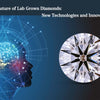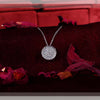
Does Lab Grown Diamonds Hold Value?
When you buy something as precious as a diamond, you purchase it intending never to part with it. Why would you part with a diamond, after all? However, despite wanting to stay with it forever, you can buy a lab-grown diamond knowing if you ever want to sell it in the future, you can make a successful sale. If you wonder if a lab grown diamond has value, the answer is a loud and resounding “Yes!” Diamondrensu’s catalog has diamonds for every occasion engagements, weddings, birthday gifts, or reselling.
Purchasing a diamond is a big deal, whether mined or lab-grown. Having a diamond in your collection fills you with joy. Therefore, your purchase must offer you a secure future, happiness, and pride. You should ensure the diamond you buy is not just an order but also a sizeable investment and lab-grown diamonds guarantee that. Contrary to popular belief, the resale value of lab-grown diamonds is higher and better than that of mined diamonds.
When one thinks of diamonds, they tend to picture natural diamonds. However, lab-grown diamonds have the same elegance and romance as mined diamonds with three additional bonuses. Lab-made diamonds are more sustainable, wallet-friendly, and have a high resale value. The difference between the two diamonds is non-existent. Lab-grown diamonds offer the whole package if you want beauty, sustainability, and a secure future without breaking the bank.
What are Lab-Grown Diamonds?
Lab-grown diamonds, also known as engineered diamonds, are lab-manufactured gems. Instead of mining them, laboratory scientists grow them in highly monitored and controlled environments using advanced technologies and processes to replicate the conditions required to create natural diamonds. A lab-created diamond’s composition is identical to a natural diamond; both comprise carbon atoms arranged in the same structure. Therefore, a lab grown diamond’s value also goes head-to-head with that of a mined diamond.
Do Lab-Grown Diamonds Have Resale Value?
In today’s world, shopping ethics have shifted from quality over money to quality and money. Juggling various expenses, such as education, work, and social life, has become challenging to manage, leading to people choosing more economical jewelry like lab-grown diamonds. A lab grown diamond’s price allows you to splurge on your favorite jewelry without worrying about money and resell it in the future for a good value. Other factors that add to lab-grown diamonds’ resale value include:
Lab-Grown Diamonds Clear the Diamond Tester
Diamond testers are specialized tests made to check a diamond’s authenticity and to separate fake diamonds from real ones. As it passes the diamond tester, you will never have to doubt a lab-grown diamond’s value. This test has various factors based on which institutions evaluate a diamond’s composition and characteristics, such as brilliance, fire, fluorescence, and durability.
Grading Certification
Certification is a significant factor in determining the resale value of lab grown diamonds. Buyers and jewelers only purchase diamonds with a grading report and GIA or IGI certification. GIA (Gemological Institute of America) has certified lab-grown diamonds since the 2000s. Given a lab diamond’s beauty, qualities, and composition, GIA has also removed ‘synthetic’ as its synonym. A lab diamond with a GIA report confirms its authenticity, resale price, and qualities, such as color, clarity, carat weight, and cut.
The grading certification of lab-grown diamonds typically includes several key factors that are evaluated and documented by accredited Gemological laboratories. Here are some of the key components included in a grading certification for lab-grown diamonds:
Carat weight. The weight of the lab-grown diamond is measured and recorded in carats.
Cut. The quality of the diamond’s cut is evaluated based on symmetry, proportion, and polish.
Color. The color of a lab-grown diamond is evaluated on a scale from D (colorless) to Z (light yellow or brown). Some laboratories may use a different color grading system.
Clarity. The clarity of the lab-grown diamond is evaluated based on the presence of inclusions (internal flaws) or blemishes (external flaws). The grading scale typically ranges from flawless (no flaws discernible under 10x magnification) to included (flaws discernible to the naked eye).
Origin. Some grading certificates may include information about the diamond’s origin or production method, which can be important for ethical or sustainability reasons.

Natural or Lab Diamonds? You Cannot Spot the Difference
For a good reason, natural diamonds have earned the title of king of gems. Their beauty stands out in the sea of gemstones and jewels. However, their beauty is not worth their exorbitant price and the damage they cause to the environment.
The best thing about lab-grown diamonds is that you can wear them anytime and anywhere without anyone noticing the difference because they cannot. One can only tell the difference if they have trained eyes, such as GIA or IGI, or use specialized equipment. Lab-grown diamonds and natural diamonds have the same characteristics. You get a high resale value when you pair this fact with lab diamonds’ price and sustainability.
What is the Resale Value of Lab-Grown Diamonds?
Buyers often think that the value of diamonds increases or retains over time. While it is true that a diamond’s beauty and dazzle remain unmatched, its resale price will never be the same as its original purchasing price, whether lab-grown or mined. A lab grown diamond’s price includes the entire process, from polishing to production to grading. It also consists of the jeweler’s share.
The reselling price would remove these factors and primarily depend on the fact that you are selling a diamond, reducing it by 30-40%. However, other elements, such as a lab-grown diamond’s certification, environment-friendly nature, sustainability, and affordability, make its resale value higher than a natural diamond, making it a better investment!

Lab-Grown Diamonds: An Investment in Our Future
Retaining a lab-grown diamond’s value depends on how you purchased it. If you remember the following factors when buying a lab-grown diamond, you will be investing in a brighter, more sparkly, and radiant future:
The 4Cs
The first thing you must do when buying a diamond is to check its 4Cs: cut, color, carat weight, and clarity. These factors determine a diamond’s price, appearance, and quality. Therefore, ensure the diamond has a D, E, or F color grading, F or IF clarity grading, and an excellent cut.
Perfect Condition
When purchasing a diamond, check it thoroughly. If you buy it in person, ensure the diamond is in perfect condition. Alternatively, if you are shopping online, ensure the store has a refund, return, or exchange window if you notice any wear and tear. Lab diamonds’ prices will decrease astronomically when you resell them if they do not look immaculate. It would be best to clean them regularly to increase their lifespan, maintain their durability, and retain their color.
Certification
Ensure the diamond you buy has an official grading certificate to confirm its authenticity and keep it safe. A grading report or certification decides a diamond’s market value. If you cannot present it while reselling the diamond, it will cause the buyer to question its authenticity.
Other Reasons to Buy a Lab-Grown Diamond
The resale value of lab-grown diamonds is one of the main reasons buyers lean toward them. However, it is not the only reason. Buying a lab-grown diamond offers you various benefits, such as:
Money is of the Essence
What makes a lab-grown diamond stand out is its affordability. Mined diamonds have a lengthy production and manufacturing process, such as mining, transportation, heavy equipment, and labor, which makes them expensive. On the other hand, a lab-grown diamond’s value is more cost-efficient when buying it and profitable when reselling it. Since these diamonds are laboratory-manufactured, their production price is lower than mined diamonds, making them 30-40% more affordable.
Guilt-Free Choice
Unlike mined diamonds, which are environmental hazards, lab-grown diamonds are greener and more sustainable. You can purchase them with a lighter conscience and no guilt knowing you are making an ethical purchase without harming the earth’s ecological structure.

Lab-Grown Diamonds Offer Versatility
You should consider lab-grown diamonds if you want to add a splash of color to your life. Its versatility makes a lab-grown diamond’s value higher than a natural diamond. Traditional diamonds are transparent and colorless. On the other hand, lab diamonds come in various colors, shapes, and sizes. For instance, if you resell a stunning 0.81 CT Round Pink lab-grown diamond ring, its color will increase its resale value.
Guaranteed Clarity
Clarity is one of the 4Cs determining a diamond’s value and refers to its inclusions or flaws. Mined diamonds form in natural environments, causing dirt to merge with them during their formation. On the other hand, you do not have to worry about impure lab-grown diamonds, as they do not contain contaminants. Therefore, not only is lab diamonds’ price more reasonable, but they are also flawless and pure.
Final Thoughts
Lab-grown diamonds are an excellent purchase for many reasons. They are affordable, versatile, environmentally conscious, and certified. Furthermore, if you want to resell one, a lab-grown diamond’s value will profit you. Diamondrensu’s collection of lab-grown diamonds offers you everything you want in a diamond, so check it out!
Leave a comment
Please note, comments must be approved before they are published.





















